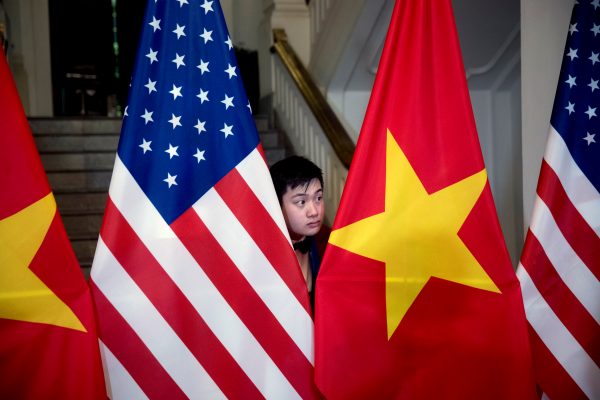There is a clear convergence of cultural diplomacy and literature in establishing bridges between nations. Over 20 years ago at a joint Vietnam–US arranged program labelled ‘The Future of Relations Between Vietnam and the US’, Vietnamese delegates expressed eagerness to learn more about the United States and welcomed the opportunity to read more works by great American authors.
At the event, the former major general Le Van Cuong, from Vietnam’s Ministry of Public Security, asserted that ‘Americans have not really understood Vietnamese people and we should put our past behind us’. With the war over and history marching forward, US relations with Vietnam have been deeper and more diverse since former US president Bill Clinton announced the formal normalisation of relations in 1995.
The Vietnamese appreciation of Hemingway, for example, originated because the United States Information Agency forbade the distribution of his works through its centres during the Cold War. Officials deemed his work — especially The Sun Also Rises, The Old Man and the Sea and A Farewell to Arms — not hostile enough to communism.
While it may not be feasible to rebrand or recreate the ‘American Corners’ program, there is a need to revisit some parts of it. Trump’s misguided foreign policy shows disdain for allies and an embrace of dictators like Kim Jong-un and Vladimir Putin. The ‘America First’ campaign slogan has set the United States on an isolationist path — it is no wonder that some foreign leaders are reshaping alliances.
Ten years ago, the late US senator Richard Lugar — a former chair of the US Foreign Relations Committee — stressed the need for the United States to interact with the world if it wished to change how it is perceived by other countries. Hemingway’s work demonstrated his understanding of this. He was involved in three major conflicts, both world wars and the Spanish Civil War, and wrote about each of them.
Hemingway knew firsthand that war claims lives, innocence and truth. These universal truths were also examined by Vietnam’s Bao Ninh in The Sorrow of War who, like Hemingway, connects the tragedy of war to the loss of youth. Both writers evoke the language of war as a burden. Many scholars contend that war marked the loss of US innocence and the bell continues to toll for all still engaged in combat.
For Vietnamese intellectuals and writers, South Vietnam’s surrender on 30 April 1975 marks not just the fall of a country and the exodus of citizens but also the fall of literature. ‘Saigon would be renamed Ho Chi Minh City, its boulevards, avenues and streets also renamed to commemorate revolutionary figures, events and slogans. So too, Vietnamese literary history would be eventually dismantled, systematically rewritten, or outright erased; books would be banned, confiscated and burned; writers silenced, censored and imprisoned’ writes Hai-Dang Phan, author of Reenactments.
Since Vietnam’s renovation — referred to as Doi Moi — began in 1986, the nation’s literature has reflected changes in political liberalisation, economic transformation and globalisation. Vietnam’s writers previously adhered to the uniform Communist Party revolutionary culture of socialist realism with its collective ethos. It has now evolved into a more pluralised culture that validates individual experiences, which are captured in the novels of more and more Vietnamese authors.
Many Vietnamese writers, such as Phan Hon Nhien and Vo Thi Hao, have been fellows at the International Writing Program at the University of Iowa. The Bureau of Educational and Cultural Affairs at the US State Department supports this cultural initiative.
Huu Thinh, Vietnam’s poet laureate and Chairman of the Vietnam Writers’ Association, revealed that his desire as a teenager to learn more about US culture and how Americans think led him to read Hemingway’s works. Thinh underscored that Vietnam was still a poor country but Hemingway’s stories have been taught in secondary schools for generations. He believes that Hemingway’s stories and their expression of humanity are in line with Vietnamese beliefs that favour kindness and raising voices against cruelty, injustice and war.
While Vietnam’s approach to cultural diplomacy remains nascent, the Diplomatic Academy of Vietnam and the Academy of Journalism and Communication have established some cultural diplomacy strategy courses. A key pillar of these efforts is building mutual understanding with other countries, especially the United States.
It’s noteworthy that in July 2011, Vietnam issued a stamp commemorating the 50th anniversary of the death of Hemingway.
La Thanh Tung, a Vietnamese writer and former deputy editor of the Van Nghe — a literature and arts newspaper — argued ‘it’s most unfortunate that we know so much about American writers, like Hemingway, but that Americans know so little about our writers’.
There is now a greater appreciation and reading of literature because of wider circulation of Vietnamese writing through English-language publishing houses and through improved access to work by the children of Vietnamese migrants to countries like Canada and the United States.
Ongoing generational conversations allow increased access to work and ideas honouring Vietnamese literary traditions while also responding to other literary figures from outside the region like Hemingway’s Cuban fisherman, Santiago, in The Old Man and the Sea.
‘I think the sea is large enough for fishermen to catch their fish but maybe they must venture out further than they should go’, says La Thanh Tung.
James Borton is a non-resident fellow at the Centre of Sea and Islands Studies at the University of Social Sciences and Humanities, Vietnam National University, Hanoi.
A longer version of this article appears in East Asia Forum Quarterly, ‘Middle Power Game’, Vol. 12 No. 1.


Americans know very little of their own political, social, and economic history and don’t know anything about its own writers like Twain and Hemingway because its top conservative political and economic circles don’t want the rest of society to be educated and be exposed to other viewpoints and perspectives even within their own country